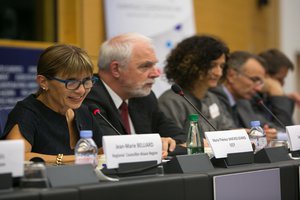News
Special Dossier on the European elections: three questions put to Marie-Thérèse Sanchez-Schmid, MEP
March 2014
In November 2012, Marie-Thérèse Sanchez-Schmid set up, together with fellow MEP Gilles Pargneaux, a cross-border liaison group at the European Parliament aimed at raising the awareness of MEPs about cross-border issues.
What actions have been carried out by the cross-border liaison group at the European Parliament?
The cross-border liaison group is an entirely new working group at the European Parliament – it is a cross-party group that looks specifically at the issue of borders and cross-border cooperation. Gilles Pargneaux and I had noticed that, although borders are at the heart of the European project, no one was looking at them as a specific area of focus. The aim of this group is to bring together and raise the awareness of our colleagues about the concrete issues that arise at each European border, in order to share the successes, find solutions to difficulties and move Europe forward for those who live in it on a daily basis. We have held several meetings since the start of 2013, which have addressed the deepening of the internal market, giving stimulus to cross-border work, the increase in Interreg funding, and cross-border reconciliation in Ireland.
What are your current cross-border concerns?
The vote in Switzerland and the revision of the Posted Workers Directive have highlighted the issue of cross-border work. The economic crisis, rising unemployment and the unsuitability of European rules have reawakened the fear of the Polish plumber. The latter may have different faces: the Romanian lorry driver or, where I live in Perpignan, the Spanish labourer. With the Swiss vote, the shock is all the greater since for the first time we are becoming aware of the fact that there are seconded French workers in the EU. So cross-border work is currently the biggest topic for us to address.
How are you promoting the cross-border dimension in the campaign for the European elections?
Cross-border cooperation is difficult to promote, especially in a period of crisis, as it is complex and emotive. The national administrative culture finds it difficult to accept change, openness and ad hoc solutions, which makes any attempt to simplify the rules futile. In particular, the border is imagined as being the last defence in the face of the crisis, economic ultra-liberalism, globalisation and its “unfair competition”. Cross-border cooperation is no longer seen as an asset but rather a threat. So we need to rethink the concept of borders in the European election campaign to turn them into a source of potential growth and cooperation.
Back to list

